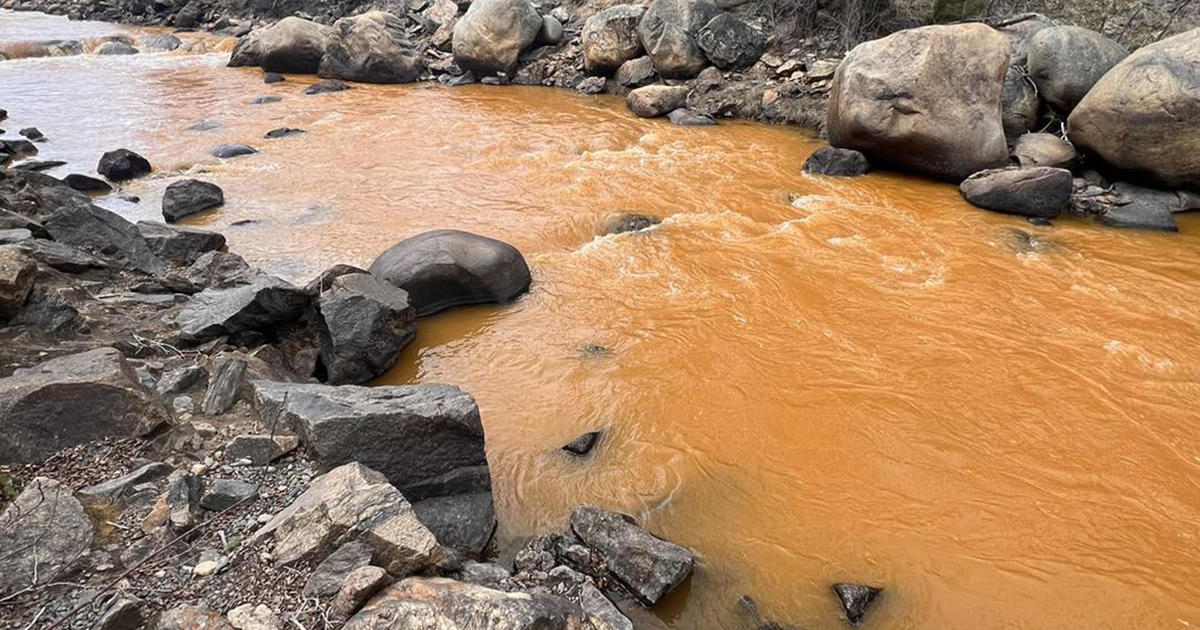A Stormwater Task Force Plan For Springs
COLORADO SPRINGS, Colo. (AP) - The Pikes Peak Stormwater Task Force is trying to explain its stormwater prevention proposal so the public will understand why they might be asked to pay $10 a month.
The task force, a citizen's group of engineers, business leaders, community activists and elected city and county officials formed in 2012, has been hosting a series of public meetings to explain its proposal and ask for public opinion. A December poll commissioned by the Task force found that 95 percent of El Paso County residents think stormwater is a significant problem, but there isn't the same consensus on who should pay to address the problem.
It's a complicated topic, but the task force says its solution makes sense. Here are the key points the task force has covered in its public meetings:
How serious is the stormwater issue?
Right now, the Colorado Springs area's stormwater infrastructure would flunk out of class. The American Society of Civil Engineers gave Colorado Springs's stormwater infrastructure a D-minus on its 2012 report card.
Stormwater runoff is rain and melted snow that flows over impervious surfaces - like parking lots, rooftops, driveways - and doesn't get absorbed into the ground. It causes streets, bridges, houses and businesses to flood and damages water quality by washing debris down gutters and streets into storm drains.
Colorado Springs Utilities has spent an estimated $100 million since 2000 rebuilding crumbling infrastructure near creeks that have been destroyed by runoff during floods, estimated Carol Baker, CSU stormwater engineer. Other utilities providers, businesses and homeowners also pay to repair stormwater damage.
People who live next to the banks of Fountain Creek have lost property as water levels raised, said Rachel Beck, the task force's media contact. Water flows into the street, yards and driveways in neighborhoods that don't have proper storm drains.
Colorado Springs is the only major city on the Front Range of the Rocky Mountains that does not have a stormwater management program, Beck said.
What's the task force's solution?
The task force wants to construct protection against stormwater runoff in the Fountain Creek watershed and the city of Falcon. Its proposal would create a regional authority - a board of 13 people who are already elected officials - that would make sure those projects happen.
There would be seven representatives from Colorado Springs, mostly city council members and either the mayor or the mayor's chosen representative, two representatives from the El Paso County Commissioners, representatives from Manitou Springs, Fountain and Monument, and a shared representative for Green Mountain Falls and Palmer Lake.
An independent engineering firm created the project list to prioritize the most-needed projects. The list is public, meaning elected officials would be held accountable for getting projects done on time.
How would the projects be paid for?
The board would charge a fee on property owners based on how much impervious surface is on a property. The money would be collected monthly for the next 20 years and cost about the same as in other Front Range communities. For the average homeowner, this would cost $10 a month, said Dave Munger, task force co-chair.
A fee rather than a tax must be imposed because governments and nonprofits are tax-exempt but contribute significant impervious surface that contribute to stormwater runoff.
All of the money collected from this fee would be designated for stormwater prevention and management. Nine percent of the fee collected would be saved in case of emergency and 1 percent would fund administration.
Other projects recognized as high priority for Colorado Springs, like streets, parks, public safety buildings or information technology, could not be funded using money collected from this proposed fee.
The proposal includes a system of checks and balances to make sure no one city is favored over another.
Colorado Springs would have more people on the board than other cities, but that's because the city has 70.7 percent of the affected citizens and 70 percent of impervious surfaces, Beck said. Regardless, Colorado Springs could not make decisions without collaborating with other representatives, Munger said.
To pass a vote, the council requires a supermajority. Two-thirds of the board members, including at least four representatives from Colorado Springs, a representative from the County Commissioners, and representatives from the small communities, have to agree for a vote to count.
Additionally, money collected in each community would fund the projects in that community over a five-year rolling average.
Good stormwater infrastructure is good for the economy, Beck said. According to an analysis by University of Colorado at Colorado Springs economics professors, the proposed stormwater infrastructure construction would create 360 jobs with annual labor income of $16.3 million, add $21 million to the local economy and increase gross domestic product by $50.1 million, all in the first year.
Today, the task force's necessary capital improvements would cost $706 million. If the proposed projects had been started 25 years ago, the cost would have been a third of that, according to the UCCS economics analysis.
"If we keep delaying this, the price tag is going to continue to go up," Beck said.
The next step is politics. The task force plans to have a ballot question by the end of August and to ask the El Paso County Commissioners to refer the proposal to the Nov. 4 ballot. Only the cities that would participate in the program would vote on the measure. The Colorado Springs City Council will discuss the task force's proposal at its Monday work session. The council will consider supporting the proposal, but the proposal would still need voter approval. Mayor Steve Bach opposes the regional plan in favor of one that only deals with Colorado Springs. Other cities in the county, such as Manitou Springs, have not decided whether or not they will support the task force. And with one final meeting on Wednesday to get their point out to the public, the Task Force is quickly running out of time to get the stormwater issue on the November ballot.
- By EMILY DONOVAN, The Gazette
(© Copyright 2014 The Associated Press. All Rights Reserved. This material may not be published, broadcast, rewritten or redistributed.)



